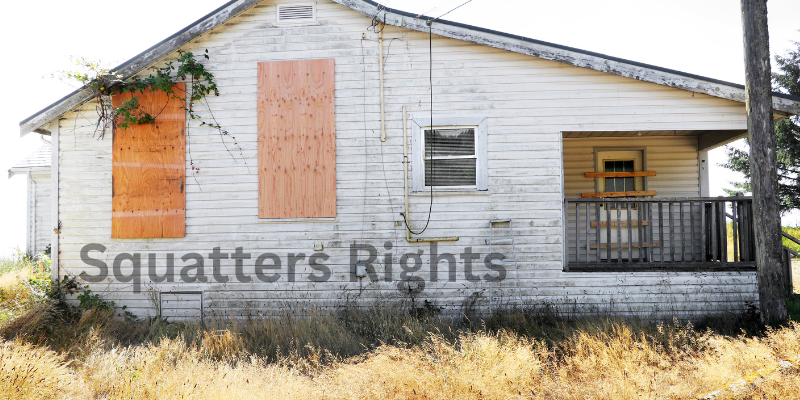
Historical Context of Squatter’s Rights in the United States

Squatters’ rights, also known as adverse possession, have a long history in the United States, dating back to the country’s early settlement and expansion. During the nineteenth century’s westward expansion, settlers frequently established homesteads on unoccupied or abandoned land.
Prior to official surveys and legal frameworks, early pioneers relied on informal property claims. This practice evolved over time into codified laws that allowed individuals to claim ownership of land by occupying it continuously and openly without permission from the original owner.
Historical precedents have influenced how adverse possession laws are interpreted in Michigan and other states. Squatters are typically required by law to occupy a property openly and continuously for a set period of time, often 15 years, and use it as their own without the rightful owner’s consent.
Understanding the historical context is essential for Michigan homeowners and real estate investors to better navigate potential property rights disputes today. Working with cash home buyers in Michigan and surrounding Michigan cities can also provide a practical solution for those looking to avoid complications and streamline the selling process.
Understanding Squatter’s Rights: An Overview
Adverse possession, also referred to as squatters’ rights, is a legal concept in Michigan that enables individuals to assert ownership of a property if they have occupied it for a specified duration without the owner’s consent. In order to successfully assert squatters’ rights, certain conditions must be met, such as the continuous and open occupation of the property for a minimum of 15 years.
The squatter must treat the property as their own, and the possession must be hostile, meaning that it is not with the consent of the rightful owner. It is essential for homeowners and real estate investors in Michigan to comprehend these requirements in order to safeguard their properties from unauthorized occupation and potential claims.
Squatters who fail to satisfy these criteria or who unlawfully occupy properties may be subject to legal consequences, including eviction. Property owners can take proactive measures to secure their investments and promptly address any issues related to squatters by becoming familiar with adverse possession laws.
Legal Definition and Implications of Adverse Possession
Adverse possession is an important legal idea in Michigan that helps people understand squatters’ rights. This affects both homeowners and real estate investors. Adverse possession lets someone claim ownership of land if certain conditions are met for a certain amount of time.
In Michigan, squatters can only get legal ownership through adverse possession if they openly, notoriously, and continuously occupy the property for at least 15 years. This means that they are on the property without the owner’s permission and can be seen.
The occupation must also be exclusive and hostile, which means that the squatter acts like the property is their own and doesn’t let anyone else claim it. Homeowners and real estate investors need to be careful about these rules because if they aren’t, a squatter could get legal rights to their property.
For protecting property investments and making sure that rightful ownership stays clear under Michigan law, it’s important to understand these effects.
Key Differences Between Trespassing and Squatting
Homeowners and real estate investors in Michigan need to know the difference between trespassing and squatting. Trespassing means going onto or using someone else’s property without their permission. This usually leads to legal problems, like fines or criminal charges.
Squatting, on the other hand, means living in a vacant or abandoned property without the owner’s permission. This can sometimes give you legal rights under adverse possession laws. To claim adverse possession in Michigan, squatters must meet certain requirements, such as living on the property continuously and openly for at least 15 years.
Squatters can get some legal protection if they have lived on a property for a long enough time and met all the other requirements. Trespassers, on the other hand, cannot. By knowing these important differences, property owners can better deal with unauthorized occupants and keep squatters from making claims against their property investments.
The Process of Claiming Squatter’s Rights: Step-by-step Guide
There are a few important steps that both homeowners and real estate investors in Michigan need to know about when they want to claim squatters’ rights, also known as adverse possession. First, a squatter must openly and continuously live on the property for a certain amount of time, which in Michigan is 15 years.
During this time, the occupation must be against the owner’s interests, which means it happens without permission. Also, the squatter must have full control of the property; they can’t share it with anyone else who doesn’t have a legal claim.
The property must also be used in a way that is well-known and obvious, so that anyone can see that someone is using it as their own. Squatters can make the property better or keep it the same while they are living there to make their claims stronger under adverse possession laws.
A squatter can file a quiet title lawsuit to get legal ownership of the property through court recognition after meeting these requirements for 15 years without stopping. Homeowners can protect their properties from possible claims by knowing these complicated details. Investors can also deal with complicated real estate situations in Michigan more easily.
Common Misconceptions About Squatter’s Rights
A lot of people in Michigan don’t understand squatters’ rights. They think that squatters can easily become the owners of a property just by living there. This misunderstanding comes from not knowing what “adverse possession” means in the law.
In Michigan, a squatter must meet strict requirements to claim adverse possession. These include open and notorious possession, exclusive physical control, hostile occupation against the owner’s rights, and continuous occupation for a statutory period of 15 years. A lot of people think that squatters don’t have any legal protections, but they do have some rights under state law.
For example, homeowners and real estate investors can’t just kick squatters out without going through the right legal steps. Some people also think that any empty property is fair game for squatting, but in reality, claims of adverse possession must be backed up by clear proof that all legal requirements have been met.
Knowing these details helps clear up misunderstandings and makes the complicated issue of squatters’ rights in Michigan easier to understand.
How Adverse Possession Affects Property Ownership
Adverse possession is a legal doctrine that can have a substantial impact on property ownership in Michigan, particularly for homeowners and real estate investors. This concept enables a squatter to potentially acquire legal title to a property if they occupy it openly, notoriously, and continuously for a statutory period, which in Michigan is 15 years.
The squatter is required to demonstrate actual possession of the property by residing on it or using it without the rightful owner’s permission during this period. In order for adverse possession claims to be successful, the possession must be exclusive and hostile, meaning that the squatter is treating the property as their own, without the owner’s consent.
To prevent squatters from making such claims, property owners should remain diligent in monitoring their properties. Real estate investors are also advised to perform thorough due diligence to uncover any potential adverse possession issues that may affect ownership rights. When navigating these challenges, Blue Moon Acquisitions can help provide guidance and solutions.
It is essential to comprehend the operation of adverse possession within Michigan’s legal framework in order to safeguard one’s property interests and guarantee clear title ownership.
Legal Challenges Faced by Property Owners Against Squatters

When dealing with squatters, property owners in Michigan have to deal with a lot of legal issues because squatters’ rights and adverse possession laws are so complicated. Squatters, who live on property without the owner’s permission, can sometimes take advantage of legal loopholes, which makes it hard for owners to get their property back.
In Michigan, if a squatter openly and continuously lives on a property for a certain amount of time, they may be able to claim ownership through adverse possession. This process has a lot of requirements, like living in the property for at least 15 years, which makes it very hard for property owners to evict someone.
Homeowners and real estate investors must follow complicated legal steps to prove they own the property and start the eviction process legally. These problems are made worse by the fact that you have to follow local eviction laws exactly and show proof that the squatter didn’t have permission to live there.
So, if you own property in Michigan and want to keep unauthorized people from living there, it’s important to know both the laws in your state and how to use the law to your advantage.
State-by-State Analysis of Squatter’s Rights Laws
Understanding squatters’ rights is critical for Michigan homeowners and real estate investors because of the specific laws governing adverse possession and tenant rights. Squatters in Michigan can claim ownership of a property through adverse possession if they meet certain legal criteria, such as open, notorious, exclusive, hostile, and continuous use for 15 years.
Squatters are required to pay property taxes during this process to strengthen their claim. Unlike some states with more lenient laws that benefit squatters, Michigan requires strict adherence to these requirements, making it critical for property owners and investors to inspect vacant properties on a regular basis and promptly address unauthorized occupants.
Furthermore, eviction proceedings in Michigan must adhere to legal protocols in order to effectively remove squatters; thus, familiarizing oneself with both local eviction procedures and state-specific squatting laws is critical for protecting real estate investments from potential adverse claims.
Ethical Considerations Surrounding Squatters’ Rights
When it comes to squatters’ rights in Michigan, both homeowners and real estate investors must take ethical considerations seriously. The concept of squatters’ rights, also known as adverse possession, raises concerns about the balance between property ownership and the rights of those who occupy vacant or abandoned properties.
On the one hand, these laws can provide shelter for people who would otherwise be homeless, emphasizing societal responsibilities to vulnerable populations. Property owners, on the other hand, face challenges when unauthorized occupants move in, potentially resulting in financial losses and legal hurdles in reclaiming their properties.
Squatters can have an impact on real estate investment strategies and timelines due to the lengthy legal processes required to resolve disputes. Ethical discussions also cover property owners’ responsibilities to adequately maintain their properties in order to deter unauthorized occupation, as well as the potential social benefits of revitalizing neglected areas through responsible property management.
Understanding these ethical dimensions is critical for stakeholders navigating the complexities of squatters’ rights in Michigan’s legal framework.
Future Trends in Property Law Relating to Adverse Possession
Homeowners and real estate investors in Michigan are becoming increasingly interested in the changing landscape of property law governing adverse possession. As more people become aware of squatters’ rights, the legal frameworks governing adverse possession are expected to change significantly.
Future trends indicate that legislation will be tightened to protect rightful property owners while balancing the historical doctrine that allows squatters to claim ownership if they meet certain criteria. Technological advancements, such as digital property records and enhanced surveillance systems, are expected to play a critical role in preventing adverse possession claims by providing clear evidence of continuous occupancy and intent.
Furthermore, legislators may propose reforms that require more stringent proof of open and notorious use, which could affect how quickly and easily squatters can establish claims. Real estate investors will need to be aware of these changes in order to protect their investments and effectively navigate potential disputes.
Recognizing how these trends could impact property rights is essential for anyone involved in Michigan’s real estate market. To make the process easier, take a look at how our process works to better understand your options.
How Long Does It Take to Evict a Squatter in Michigan?
Evicting a squatter in Michigan can be a difficult process for homeowners and real estate investors because of the state’s unique legal procedures governing squatters’ rights. In Michigan, the time it takes to evict a squatter depends on factors such as the property owner’s prompt legal action and the responsiveness of local courts.
Typically, the eviction process begins with the service of an eviction notice, such as a Notice to Quit or Demand for Possession, which informs the squatter of their unlawful occupancy and gives them a period of time, usually 30 days, to vacate voluntarily. If the squatter fails to leave within this time frame, the property owner must file an eviction action in district court.
The court schedules a hearing so that both parties can present their cases. If the judge rules in favor of the homeowner or investor, an order of eviction is issued, allowing law enforcement to remove the squatter as needed.
Overall, while some cases may be resolved quickly within a few weeks, more complex situations may take several months due to potential legal challenges or appeals by squatters asserting adverse possession claims under Michigan law. Understanding these timelines and consulting with experienced property dispute lawyers is critical for successfully navigating squatters’ rights issues in Michigan.
What Is the Shortest Time for Squatter’s Rights?
Homeowners and real estate investors in Michigan need to know how long squatters’ rights last. Adverse possession, also known as squatters’ rights, lets people claim ownership of property after living there for a certain amount of time.
This time frame in Michigan is 15 years. For squatters to successfully claim adverse possession, their occupation must be open, well-known, exclusive, hostile, and continuous for the full 15 years.
This means that squatters must use the property without the owner’s permission and keep it in a way that makes it clear that they are there. Homeowners and real estate investors should check on their properties often to make sure that no one is living there without permission, which could lead to a successful adverse possession claim.
In Michigan’s unique real estate market, knowing these legal details can help protect investments and make sure that property ownership stays safe.
Why Do Squatters Have More Rights Than Homeowners?

In Michigan, squatters’ rights, also known as adverse possession, can be perplexing to homeowners and investors. The idea that squatters have more rights than actual homeowners stems from a legal principle intended to encourage productive use of land.
Squatters can gain legal ownership of a property by occupying it continuously, openly, and without permission for a set period of time, typically 15 years in Michigan. This process ensures that land is not left idle and unproductive, which could harm the community and economic development.
Homeowners may perceive this as an imbalance because, if a squatter meets all legal requirements for adverse possession, they can potentially claim ownership even against the wishes of the original property owner. However, homeowners must understand that these laws are not intended to encourage illegal occupancy, but rather to promote responsible land stewardship by ensuring properties are maintained and used effectively.
Real estate investors need to stay informed about these regulations to safeguard their properties from potential claims by long-term occupants who may establish squatting rights under Michigan law. Partnering with a company that buys homes in Detroit and other cities in Michigan can also help investors manage such risks more effectively.
Can I Physically Remove Someone From My Property in Michigan?
In Michigan, the issue of physically removing someone from your property is subject to specific legal protocols that homeowners and real estate investors must understand. Under Michigan law, taking matters into your own hands to forcibly evict a squatter or unauthorized occupant is illegal and can result in serious legal consequences.
Instead, property owners must follow the formal eviction procedure outlined in the state’s landlord-tenant legislation. Before law enforcement can carry out the removal, a notice to quit must be served, an eviction petition must be filed, and a possession judgment must be obtained.
Understanding squatters’ rights in Michigan is critical, as they can sometimes protect individuals who occupy a property without permission. Homeowners and real estate investors should be aware that attempting to avoid the legal process may result in liability and criminal charges.
To ensure compliance and effectively protect one’s property rights, it is recommended that one consult with a qualified attorney who is familiar with Michigan’s real estate laws.
Useful Michigan Blog Articles
- Real Estate Attorney Fees For Home Sellers In Michigan
- Who Pays Closing Costs When Selling A Home In Michigan
- Selling A Michigan Home With Unpermitted Work
- Sell A House With Code Violations In Michigan
- Selling Your House During Divorce In Michigan
- Selling A Michigan House With Foundation Issues
- Essential Paperwork For Selling Your Michigan Home By Owner
- Expert Tips For Selling A Fire-Damaged House In Michigan
- Understanding Squatters’ Rights In Michigan
- Who Is Responsible For Paying Taxes When Selling A House In Michigan?
- Selling A Michigan Home Needing Repairs Without Renovations
- How To Sell Your House And Continue Living In It: A Guide For Michigan Homeowners

| SQUATTERS’ RIGHTS | SQUATTER’S RIGHTS | HOLDOVER TENANTS | LANDLORDS AND TENANTS | INSURANCE COMPANY | INSURANCE AGENCY |
| RENTAL PROPERTIES | RENTAL PROPERTY | RENTERS | JAIL | EXCLUSIVE POSSESSION | FELONY |
| LENGTH | LEASE | LEASE AGREEMENTS | SOFTWARE | MISDEMEANOR | L.A. |
| LOS ANGELES | DEED | CRIME | U.S. | RESTITUTION | PREMISES |
| PAYMENT | NEW YORK | MONEY | INFORMATION | FEE | |
| THE SQUATTER TO | TO THE SQUATTER | A PROPERTY FOR | SQUATTERS RIGHTS IN MICHIGAN | IN MICHIGAN A SQUATTER | A PROPERTY FOR A |
